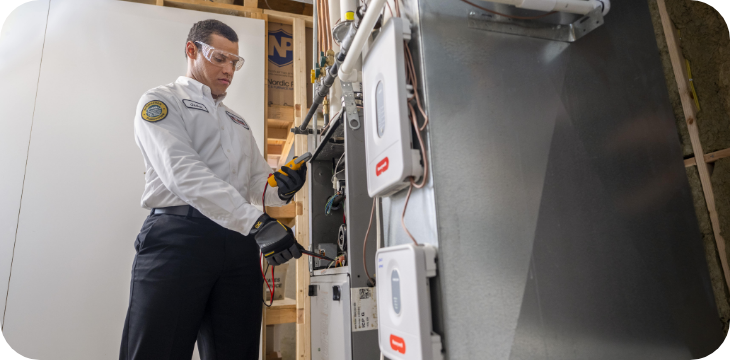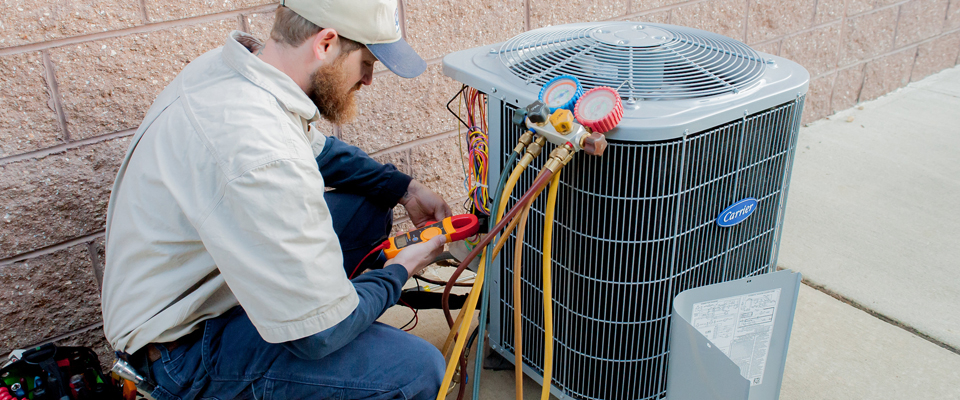Just How to Pick the Right A/c System for Your Requirements
Choosing the suitable HVAC system is a crucial decision that requires careful factor to consider of numerous aspects. Begin by assessing your home's size, format, and special demands, as these components determine the needed capacity and arrangement of the system. Furthermore, establishing a spending plan that incorporates installment and long-lasting operational expenses is necessary. As you evaluate your options, recognizing energy effectiveness scores and the implications of your neighborhood climate will certainly play a considerable role in your option. The myriad of system kinds offered can complicate this process, leading one to question which course inevitably leads to optimal convenience and effectiveness.
Assess Your Home Size
Assessing your home size is a vital initial action in picking the ideal Cooling and heating system. A HVAC system that is too tiny will certainly have a hard time to maintain comfortable temperatures, leading to raised power intake and use on the system.
To accurately evaluate your home size, gauge the square video of each room, considering elements such as ceiling elevation and the design. Furthermore, think about the insulation high quality and the number of home windows, as these components impact thermal efficiency. Houses with open floor strategies might require different system arrangements contrasted to those with lots of split areas.
Utilizing the Guidebook J tons calculation approach can supply an extra specific quote of your a/c needs. This approach represent various variables, consisting of neighborhood climate, solar gain, and occupancy patterns. By very carefully examining these elements, you can guarantee that your picked cooling and heating system is suitably sized, resulting in enhanced convenience, energy effectiveness, and long life of the devices.
Determine Your Budget Plan
Determining your budget is a critical action in the heating and cooling system selection procedure, as it establishes the specifications for your alternatives - DMAKS HVAC. A HVAC system is a significant financial investment, and comprehending your monetary limitations will aid narrow down selections that fit within your ways
Begin by analyzing not only the preliminary acquisition price yet also setup prices, which can vary significantly depending upon the intricacy of the task. Take into consideration ongoing costs such as maintenance, repair work, and energy usage. A system might show up cost effective initially yet can bring about greater costs in time if it is less effective.
It is suggested to allot a backup fund for unexpected costs that may emerge throughout installment or first system changes (DMAKS HVAC). Additionally, explore financing options or rebates that may be available, as these can ease the burden of upfront costs
Inevitably, having a clear budget plan allows you to involve with cooling and heating experts more properly, ensuring you get customized guidance that straightens with your economic objectives and home requirements. By being thorough concerning your spending plan, you can make educated decisions that boost convenience without jeopardizing financial security.
Evaluate Energy Performance
Energy effectiveness plays a vital function in the overall efficiency and cost-effectiveness of your a/c system. When selecting a system, it is vital to consider its energy effectiveness rankings, as these figures straight influence your energy costs and environmental impact. Look for systems with a high Seasonal Energy Effectiveness Proportion (SEER) for cooling and a high Annual Fuel Utilization Performance (AFUE) ranking for heating. helpful site Greater rankings indicate higher effectiveness, suggesting more comfort for less power intake.
Additionally, consider the Energy Star accreditation, which indicates that the system meets strict effectiveness guidelines set by the Epa. Purchasing a Power Star-rated heating and cooling system can cause substantial financial savings with time, specifically in locations with severe temperature level changes.
Another aspect to examine is the system's size and ability. An oversized or small device can bring about inadequacy and raised power expenses. DMAKS HVAC. Appropriate sizing, usually established via a Hand-operated J lots estimation, makes certain that the system runs at ideal efficiency


Take Into Consideration Climate and Atmosphere
When choosing a cooling and heating system, it is critical to consider the regional environment and ecological conditions, as these aspects dramatically affect the system's efficiency and performance. Various areas experience varying temperature extremes, humidity levels, and seasonal changes, all of which influence home heating and cooling down needs.

Moreover, regional ecological variables, such as air high quality and possible allergens, must educate your choice. Solutions equipped with sophisticated purification technologies can assist minimize pollutants and supply cleaner air. Additionally, think about the power resources available in your area-- some cooling and heating systems are much more reliable when powered by gas or renewable energy resources.
Ultimately, aligning your a/c system option with your neighborhood environment and ecological factors to consider will result in improved convenience, boosted performance, and lower power costs.
Explore System Types and Features
As home owners look for to maximize convenience and efficiency, check exploring the various types of a/c systems and their one-of-a-kind attributes comes to be essential. The primary types of HVAC systems include central Our site air, heatpump, ductless mini-split systems, and heaters. Each system offers distinct benefits customized to various requirements and choices.
Central air systems supply uniform cooling throughout a home, making them perfect for larger spaces. Heat pumps work as both home heating and cooling services, utilizing electricity to move warm, which can cause reduced power expenses. Ductless mini-split systems are becoming increasingly preferred as a result of their versatility and ease of installment, permitting home owners to manage the temperature in specific areas without comprehensive ductwork.

Final Thought
In verdict, picking the appropriate heating and cooling system demands cautious factor to consider of different variables, consisting of home dimension, spending plan restraints, power performance, neighborhood environment, and readily available system types. A detailed assessment of these aspects ensures optimal comfort and cost-effectiveness. By adhering to a structured strategy, home owners can make informed choices that align with their specific needs and choices, inevitably bring about enhanced interior air high quality and energy savings.